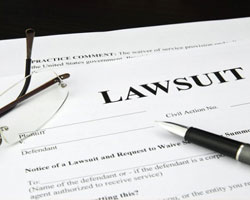Lawsuits and Disputes

When the actions of another person have cost you money, or otherwise limited or infringed on your rights, like most people, you’ll probably try to work it out and come to a resolution that’s fair. But if the person who caused your losses won’t work with you, you may need to take legal action to get the outcome you want. You have the right to file a lawsuit, also known as a civil suit or civil action, to seek financial compensation for your losses. There are very specific rules, however, regarding where a lawsuit may be filed, as well as the process for moving from the initial filing through the gathering of evidence to trial.
GetLegal.com’s Lawsuits and Disputes Center walks you through the steps involved in filing a civil action. You’ll also find a wealth of information about the different courts, different types of legal actions, and ways that you can resolve legal controversies without the time and expense of litigation (such as mediation and arbitration).
Connect with Top-rated Attorneys Near You
Lawsuits and Disputes Practice Areas
Latest Article
Joint Custody vs. Sole Custody: What Courts Prefer Today
Custody decisions are not about rewarding or punishing parents. Courts focus on one question: what arrangement best supp... Read More
Parenting Plans: What Must Be Included for Court Approval
Courts don’t approve parenting plans because they look fair to parents. They approve them because the plan clearly pro... Read More
Employee Misclassification: Independent Contractor vs. Employee
How a worker is classified matters more than many people realize. Being labeled an independent contractor instead of an ... Read More
GETLEGAL®ATTORNEY DIRECTORY
Find Leading Attorneys in Your Area
NEED PROFESSIONAL HELP?
Talk to an Attorney
How It Works
- Briefly tell us about your case
- Provide your contact information
- Choose attorneys to contact you









